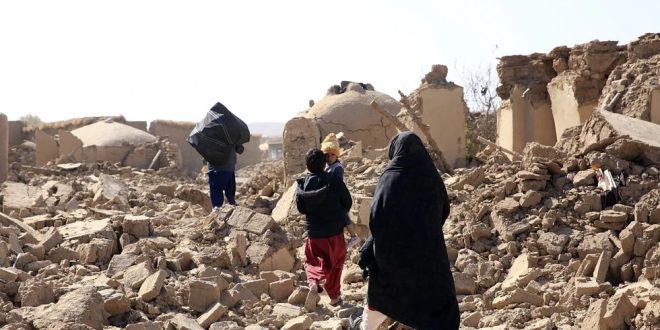UN says Afghan women face ‘deadly situation’ during quakes amid Taliban restrictions

KABUL – In the wake of recent devastating earthquakes in Afghanistan, women and girls find themselves in an exceedingly perilous situation due to the ongoing humanitarian and civil rights crises, according to a United Nations official. These quakes have claimed thousands of lives, with more than 90% of the casualties being women and children, further exacerbated by the country’s recent political turmoil after the Taliban’s takeover.
The UN Women agency released a concerning update focusing on the challenges confronting women in various parts of Herat province, where a series of violent earthquakes and aftershocks wreaked havoc this month, leaving countless homes in ruins.
Cultural norms have compounded the misery for women, as they are unable to share tents with neighbors or other families, as outlined in the UN agency’s recent report. Moreover, many women encounter difficulties in accessing crucial humanitarian aid, particularly if they lack a male relative who can act as an intermediary. Unfortunately, there is a lack of female aid workers and distribution points, further complicating matters.
Women affected by the earthquake have reported that obtaining aid necessitates the presence of a male relative’s national identity card. They also require appropriate clothing, including the Islamic headscarf, to access services and aid effectively, as emphasized in the update.
Alison Davidian, the UN’s special representative for women in Afghanistan, pointed out the disproportionate impact of natural disasters on women and girls and the often inadequate consideration of their needs in crisis response and recovery efforts. She underscored the deadly confluence of earthquakes and the ongoing crises in humanitarian and women’s rights.
One of the reasons for the high number of casualties among children and women, at least 1,482 deaths, is their higher likelihood of being indoors when the earthquakes struck, according to aid officials. Notably, Taliban officials provided higher casualty figures than humanitarian organizations, reporting more than 2,000 fatalities.
Davidian also highlighted the increasing restrictions imposed on women and girls over the past two years, which have resulted in their confinement to their homes. The Taliban’s measures include barring girls from attending school beyond the sixth grade, restricting women from public spaces and most jobs, and imposing strict dress codes, as well as requiring a male chaperone for long journeys.
While Afghan women have been largely excluded from non-governmental organization jobs, there are some exemptions for emergency and healthcare roles. However, the majority of emergency assistance in earthquake-ravaged Herat is channeled through local intermediaries, typically male community or religious leaders.
The UN update noted that women identified community leaders as their primary challenge when seeking help, as these leaders are not always informed about the most vulnerable women in their communities, further underscoring the dire circumstances facing Afghan women and girls in the aftermath of the quakes.
culled from Afghanistan Times

